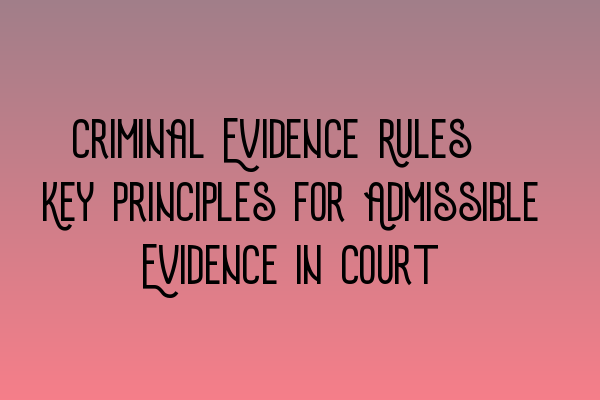Criminal Evidence Rules: Key Principles for Admissible Evidence in Court
When it comes to criminal cases, the admissibility of evidence plays a crucial role in determining the outcome of a trial. As a solicitor, understanding the key principles of criminal evidence rules is essential for building a strong case and ensuring justice is served. In this article, we will explore the fundamentals of admissible evidence in court, providing you with valuable insights to navigate the complexities of criminal law.
1. Relevance
One of the fundamental principles of admissible evidence is relevance. Only evidence that is directly related to the case at hand is considered admissible in court. This means that any information, documents, or testimonies presented must have a logical connection to the issues being litigated. As a solicitor, it is crucial to carefully assess the relevance of evidence before introducing it in court. Focusing on the key facts of the case will help you determine which evidence is admissible and which should be excluded.
2. Hearsay
Hearsay evidence is another important aspect to consider when preparing your case. Hearsay refers to statements made outside of court by individuals who are not present at the trial, but their statements are being offered as evidence. Generally, hearsay evidence is inadmissible as it violates the principle of direct examination and cross-examination. However, there are exceptions to this rule, such as spontaneous statements or statements made under certain circumstances. Understanding the nuances of hearsay exceptions is crucial to ensuring the admissibility of evidence.
3. Authentication
Authentication is a vital requirement to establish the admissibility of certain types of evidence. This principle ensures that the evidence presented in court is genuine and not tampered with. For example, before introducing a document as evidence, it must be properly authenticated to prove its authenticity. Authentication can be achieved through various means, such as witness testimony, expert analysis, or technological verification. As a solicitor, it is crucial to carefully authenticate the evidence to avoid any challenges to its admissibility.
4. Expert Testimony
In some cases, expert testimony may be necessary to establish certain facts or provide an in-depth understanding of complex subject matters. Expert witnesses are individuals with specialized knowledge, skills, or experience in a particular field relevant to the case. Their testimony can help clarify technical aspects, offer professional opinions, or provide insights that are beyond the understanding of the average person. However, the admissibility of expert testimony is subject to various rules and criteria, such as qualifications, reliability, and relevance. It is crucial for solicitors to carefully select and prepare expert witnesses to ensure their testimony is admissible in court.
5. Prejudice and Probative Value
Another consideration when assessing the admissibility of evidence is the balance between prejudice and probative value. Evidence that is highly prejudicial, meaning it may unduly influence the jury or create unfair bias, may be excluded from the trial. On the other hand, evidence with a high probative value, meaning it is highly relevant and helpful in proving or disproving a fact, is more likely to be admitted. Striking a balance between prejudice and probative value is essential for a fair trial and ensuring the integrity of the evidence presented.
Understanding these key principles of admissible evidence in court is crucial for solicitors practicing criminal law. By adhering to these rules, solicitors can build strong cases, effectively challenge the evidence of the opposing party, and ultimately achieve justice for their clients.
For more insights into criminal law and related topics, refer to the following articles:
- LLC Formation Made Simple: Step-by-Step Guide for UK Entrepreneurs
- Business Regulations in the UK: A Comprehensive Overview
- Preparing for the SQE Exam: Strategies and Resources for Success
- SQE Workshops and Webinars: Accelerate Your Exam Preparation
- Delaware Corporate Law for UK Solicitors: Key Insights and Practices
